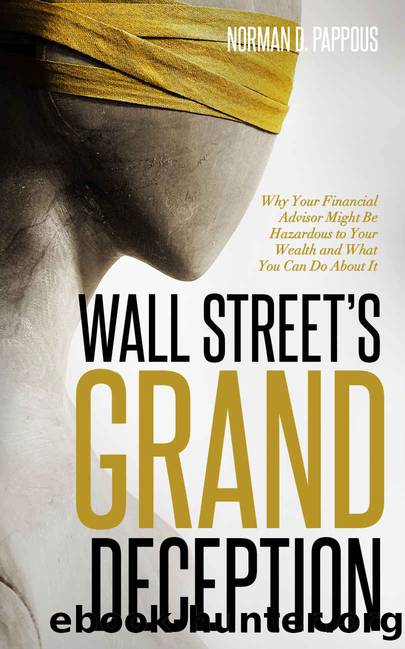Wall Street's Grand Deception: Why Your Financial Advisor Might be Hazardous to Your Wealth and What You Can Do About It by Norman D Pappous

Author:Norman D Pappous [Pappous, Norman D]
Language: eng
Format: epub
ISBN: 9798986615912
Publisher: Contango Publishing
Published: 2022-10-19T22:00:00+00:00
CHAPTER 5
MisconductâMisconduct Everywhere
In Chapter 6, I outline specific strategies so you can find a high-quality, skilled advisor. But first, letâs look at how we got here. Clearly, this situation is highly unfavorable to investors. But at the same time, this industry claims to benefit investors.
How exactly did we get hereâwhere did all of this start?
The Evolution of a Monster
As we previously covered, most wealth management firms donât require investment knowledge or experience to get hiredâonly passing the regulatory exam. Additionally, most firms donât really encourage their advisors to brush up on their investing skills.
These lax standards are the result of an evolution that started with the dot-com bubble of the late 1990s. At that time, it was not uncommon for advisors to charge 2 to 3 percent in management fees per year to investors. With that level of revenue, advisors could earn a good living serving a small group of clients.
But that was before extreme greed took hold of both Wall Street and Main Street. In the late 1990s, technology stocks were booming. It was not uncommon for a tech stock to jump double digits in a week. And since the internet and cable television now brought news to us 24/7, everyone saw the riches multiply. The topic of every conversation at every party? Stocks!
And it wasnât just the young and tech-savvy, either. All ages wanted in.
Many financial advisors were trying to fight the trend, warning people that it could be a bubble. But as tech stocks skyrocketed persisted, most financial advisors surrendered and started putting pretty much everyone, including retirees, into technology stocksâprimarily because the clients demanded it.
Of course, Wall Street firms were in on it tooâstoking the fires of greed. Their analysts were slapping buy recommendations on stocks with no profits and little earnings. For Merrill Lynch, this turned into a $100 million lesson when they were later taken to court by then New York Attorney General Eliot Spitzer. Internal emails showed that while Merrill analysts rated these dot-com companies publicly as âbuyâ or âstrong buy,â those same analysts privately referred to them as âpieces of junk.â24
Once the music stopped, many of these stocks fell precipitously. Even high-quality technology stocks like Cisco Systems would lose over 60 percent of their value. Those who held Cisco were lucky, as many of the speculative internet stocks quickly collapsed 90 percent or more. Many companies declared bankruptcy and went out of business.
Billions of dollars of investor money were wiped out. MarketWatch characterized the end of the dot-com bust this way: âThe bust ended a brief but phenomenally lucrative period for investors willing to take a chance on unproven technology companiesâ¦and on largely unproven fund managers who claimed to understand them.â25
Lawsuits Galore
Out of the ashes came lawsuitsâthousands of lawsuits asking for billions of dollars in damages from Wall Street firms. Many alleged that financial advisors should have known and prevented unsophisticated investors from taking on the risks associated with firms with no track record. To be fair, many of these plaintiffs had invested in stocks that their financial advisors warned them against.
Download
This site does not store any files on its server. We only index and link to content provided by other sites. Please contact the content providers to delete copyright contents if any and email us, we'll remove relevant links or contents immediately.
The Black Swan by Nassim Nicholas Taleb(7110)
Bad Blood by John Carreyrou(6611)
Pioneering Portfolio Management by David F. Swensen(6289)
Millionaire: The Philanderer, Gambler, and Duelist Who Invented Modern Finance by Janet Gleeson(4469)
Skin in the Game by Nassim Nicholas Taleb(4239)
The Money Culture by Michael Lewis(4198)
Bullshit Jobs by David Graeber(4179)
Skin in the Game: Hidden Asymmetries in Daily Life by Nassim Nicholas Taleb(3992)
The Wisdom of Finance by Mihir Desai(3735)
Blockchain Basics by Daniel Drescher(3574)
Liar's Poker by Michael Lewis(3442)
Fooled by Randomness: The Hidden Role of Chance in Life and in the Markets by Nassim Nicholas Taleb(3108)
Hands-On Machine Learning for Algorithmic Trading by Stefan Jansen(3067)
The Intelligent Investor by Benjamin Graham Jason Zweig(3036)
Mastering Bitcoin: Programming the Open Blockchain by Andreas M. Antonopoulos(3036)
The Power of Broke by Daymond John(2975)
Investing For Dummies by Eric Tyson(2948)
You Are What You Risk by Michele Wucker(2783)
Market Wizards by Jack D. Schwager(2698)
